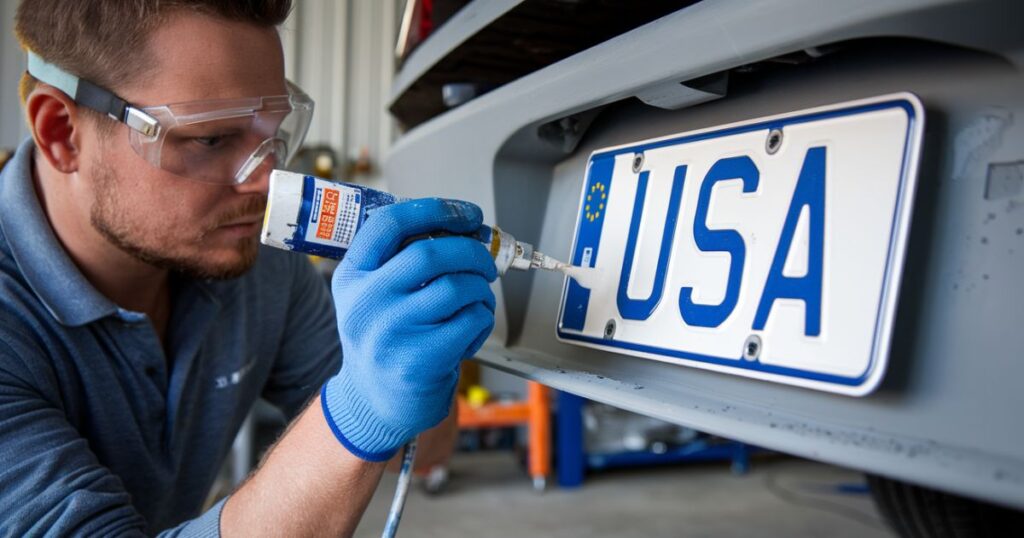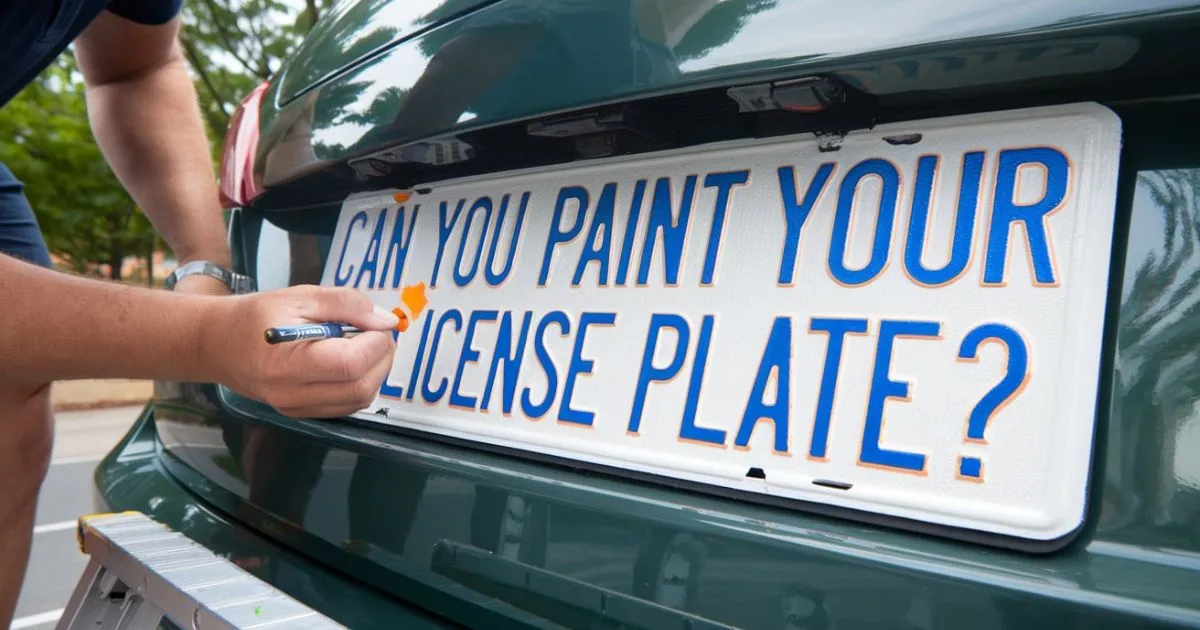Painting your license plate involves using paint on the car’s registration plate. People may also try this for personalization or to restore damage. However, it could be illegal if it makes the plate unreadable or hides vital information. Always take a look at neighborhood laws before portraying your registration code.
Many car proprietors love customizing their vehicles, however, one question regularly arises: Can you paint your license plate? While portraying your registration code would possibly appear to be a fun way to customize your automobile, there are regulations you want to observe. In some locations, altering the arrival of your registration code could cause fines or prison issues.
Painting your license plate is commonly now not recommended. In many locations, it’s far unlawful to adjust the plate in any manner, as it can make the numbers tough to read. Modifications can bring about fines or penalties. It’s excellent to test nearby laws before making any adjustments to your registration code.
Why Do People Want to Paint Their License Plates?
People might also need to paint their license plates for various reasons, including:
- Aesthetic Reasons: Some individuals prefer to personalize their automobiles to healthy their particular fashion. Custom paint could make the registration code stand out and supplement the overall appearance of the automobile.
- Restoration or Repair: If the license plate has been broken or is tough to read, painting it would look like a value-powerful manner to restore its appearance.
- Creative Expression: Many car fanatics enjoy enhancing their automobiles in one-of-a-kind ways, and portraying the license plate might be one of the customization options they explore.
While these reasons may sound attractive, the subsequent phase will cover whether such modifications are prison and permissible.
Is It Legal to Paint Your License Plate?

The legality of painting or modifying your Will Run License Plate largely depends on the regulations of your jurisdiction. Generally, there are strict policies governing license plates, as they serve as a legitimate form of vehicle identification. Alterations to your Will Run License Plate could lead to fines or legal consequences if they make the plate unreadable or non-compliant with local guidelines.
U.S. Laws and Regulations
In the US, license plate legal guidelines range through the country, however, there are a few unusual rules that most states follow. For example:
- Visibility and Readability: In almost every country, the license plate needs to be seen and readable always. Any modification that makes it more difficult to read, such as portraying the characters or masking them with designs, is prohibited. Some states even have regulations pointing out that license plates must be reflective for visibility at night, which painting could compromise.
- No Obstructions: Many states additionally have laws prohibiting any alteration that obstructs the view of the license plate. If the paint is simply too thick or covers vital details, it can be seen as an obstruction, resulting in fines or maybe the requirement to replace the plate.
- State-Specific Regulations: Some states, like California, are mainly strict when it comes to changes. In California, for instance, you can’t adjust the registration code’s design, color, or reflective coating, because it’s considered a contravention of kingdom regulation. Meanwhile, different states may be greater lenient but require the plate to be in a precise situation and legible.
International Laws
If you are now not within the United States, worldwide legal guidelines also can vary considerably. In many countries, editing a license plate, whether or not by using painting or in any other case, is illegal because it could affect the capacity of law enforcement and different governments to become aware of your vehicle’s speed.
For instance:
- European Union: In the EU, license plate legal guidelines are stringent, and any amendment to the plate is normally prohibited. Modifications, consisting of painting or changing the design, could lead to fines or even impoundment of the automobile.
- Australia: In Australia, each state has its personal vehicle rules, but usually, license plates cannot be altered in a way that makes them unreadable. Customizing a plate with paint or other substances could result in a penalty.
How to Paint Your License Plate Safely (If Allowed)

If, after reviewing the legalities and figuring out that it’s permissible in your jurisdiction to color your registration code, you can nevertheless want to proceed with caution. Here are a few recommendations to help you paint your registration code appropriately:
- Use Proper Materials
Use the handiest paint that is designed for use on steel surfaces. Automotive touch-up paints or spray paints designed for license plates are typically a safe guess. Avoid the use of normal family paint, as it can not adhere well to the plate and will result in peeling or fading.
- Avoid Covering Important Information
Be positive that the paint no longer covers important factors like the national call, registration numbers, or reflective coating. Your registration code should stay completely visible and readable at all times.
- Consider the Reflective Coating
Many license plates have a reflective coating that makes them seen at night. If you’re painting the plate, be sure now not to disturb or obscure this coating. Some states may additionally even require that the reflective nature of the plate continue to be intact for it to be a road prison.
- Keep the Plate Clean and Legible
If you need to color your registration code due to fading or damage, make sure that the surface is smooth before painting. Dust, dirt, or oil can cause the paint to chip off quickly, mainly in addition to headaches.
Risks and Consequences of Painting Your License Plate

While painting your license plate might look like an easy answer, there are numerous dangers and results to worry about:
Legal Penalties and Fines
Legal consequences and fines for portraying your license plate can be big, depending on your area. In many locations, changing the advent of your registration code in any way that makes it difficult to read or obstructs vital information can bring about fines. For example, if the characters are obscured or the reflective coating is compromised, law enforcement can also issue a citation.
In some areas, the penalties can include hefty fines or the requirement to update the registration code altogether. Repeated violations can also even lead to vehicle impoundment or problems renewing your registration, making it critical to observe nearby legal guidelines.
Difficulty in Identification
Difficulty in identity happens when a license plate becomes tough to study or understand, often due to changes like portrayal, damage, or dust buildup. This can pose great troubles for law enforcement, emergency responders, and other drivers, as they rely upon honestly seen plates to identify vehicles.
In instances of accidents, visitor violations, or criminal topics, unreadable plates can complicate investigations and delay responses. Additionally, unreadable plates can result in fines or legal consequences for the automobile owner. It’s vital to hold a smooth, visible, and undamaged license plate to ensure proper identity and compliance with local guidelines.
Damage to the Plate
Damage to the license plate can arise if the incorrect sort of paint or application approach is used. Applying thick or low-excellent paint can also cause the plate to become worse over the years, leading to peeling or cracking. This harm can make the registration code difficult to examine, that is a felony violation in many locations.
Additionally, certain paints might corrode the plate’s surface or affect its reflective coating, which is necessary for visibility at night. Damaging the registration code could also result in the need for a replacement, which can be pricey and time-consuming. Always ensure the right care while preserving your plate.
Alternatives to Painting Your License Plate

If you are seeking to customize your automobile but want to avoid capacity criminal hassle, here are some alternatives:
Custom Frames
Custom frames are a terrific way to customize your vehicle without changing the registration code itself. They are available in various materials, including chrome steel, plastic, and aluminum, and might feature specific designs, shades, or customized text.
Custom frames are prison in maximum places so long as they don’t hinder essential information on the license plate, such as numbers or registration stickers. They offer an easy and inexpensive manner to feature a non-public touch on your vehicle whilst closing completely compliant with nearby rules.
Vanity Plates
Vanity plates are custom license plates that allow automobile owners to customize their cars with particular combinations of letters, numbers, or symbols. These plates are often used to express individuality, showcase non-public pastimes, or even deliver humor.
In many places, conceitedness plates are to be had for a further fee through the Department of Motor Vehicles (DMV) or equal corporation. They come in various designs, such as unique pictures or logos, and are imprisoned if they follow the country’s unique guidelines. Vanity plates offer an innovative and prison manner to feature non-public contact with a car without violating guidelines.
Stickers or Decals
Stickers or decals are a famous and legal way to personalize your automobile without modifying vital components just like the registration code. They come in diverse designs, sizes, and substances, allowing automobile proprietors to express their style, and interests, or maybe promote a logo.
Applying stickers to bumpers, home windows, or other areas of the automobile is typically allowed as long as they don’t hinder the driving force’s view or violate any local legal guidelines. Stickers and decals are smooth to get rid of and replace, making them a bendy and non-permanent customization alternative for those seeking to upload a personal contact to their car.
Conclusion
In conclusion, painting your registration code is not encouraged in most instances because of felony and sensible worries. Altering a license plate, whether for aesthetic motives or to cover harm, can result in fines or penalties if it makes the plate unreadable or obstructs critical info. In many areas, laws require that license plates stay seen, reflective, and legible always.
Modifying a plate can also cause capability safety problems, along with difficulties in identification using law enforcement. Before trying any adjustments for You Paint Your License Plate, it’s critical to test local policies to avoid felony hassle. If you want to customize your vehicle, recollect more secure options like custom frames or vanity plates that permit non-public expression without risking non-compliance.
FAQ’s
Is it prison to color your registration code?
In most places, painting your registration code is unlawful as it can be difficult to understand vital information.
Can painting your license plate result in fines?
Yes, changing your registration code can cause fines or penalties if it’s unreadable.
What occurs if I paint over the numbers on my license plate?
It could make the plate unreadable, leading to potential criminal problems.
Can I paint my registration code to cover up the damage?
It’s not advisable; keep in mind replacing the plate instead to avoid felony problems.
Are there alternatives to painting my registration code?
Yes, you may use custom frames or stickers to customize your vehicle legally.









